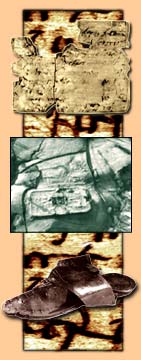
The Vindolanda writing tablets, written in ink on post-card sized
sheets of wood, have been excavated at the fort of Vindolanda, immediately
south of Hadrian’s Wall in northern England. Dating to the
the late first and early second centuries AD, the formative period
of Roman Britain’s northern frontier, they were written by
and for soldiers, merchants, women and slaves. Through their contents,
life in one community on the edge of the Roman world can be reconstructed
in detail.
This exhibition introduces the tablets, drawing on information
from the documents themselves and archaeological evidence from Vindolanda
and elsewhere. Follow the links to explore the exhibition. The individual
sections contain links to tablets in the database relevant to their
theme. Highlights can also be found under ‘Browse’.
For information on specific aspects of the tablets’ content,
such as names, army units and ranks, the calendar, Roman currency
and weights and measures, see the reference section.
Vindolanda and its setting –
the excavations and a site tour
History – Roman Britain’s
frontiers and Vindolanda
Forts and military life – the fort
and the lives of soldiers
People – officers, men, families
and civilians at Vindolanda
Documents – writing and learning
Latin
Reading the tablets – alphabets,
scripts and reading the texts
|